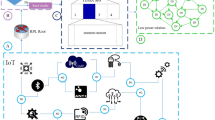Abstract
Internet of Things (IoT) has emerged with the recent developments in different technologies such as smart sensors, radio frequency identifier (RFID), wireless networks and communication protocols with various applications. However, gathering large amounts of multimedia data from IoT applications cause traffic congestion. Congestion can affect network quality of service (QoS) parameters such as latency and packet delivery rate (PDR). On the other hand, providing appropriate packet routing scheme in IoT is an important issue. Hence, in this paper, we propose a routing scheme for IoT using shuffled frog leaping algorithm (SFLA). RISA uses SFLA to find a content-based path between the source and destination nodes. RISA can reduce energy consumption and improve the network lifetime using an appropriate data aggregation scheme. The simulation results of the proposed method in Matlab software show that the proposed method is able to optimize the power consumption, network lifetime, throughput, and PDR.












Similar content being viewed by others
References
Azari L, Ghaffari A (2015) Proposing a novel method based on network-coding for optimizing error recovery in wireless sensor networks. Indian J Sci Technol 8:859–867
Bouaziz M, Rachedi A, Belghith A, Berbineau M, Al-Ahmadi S (2019) EMA-RPL: energy and mobility aware routing for the internet of mobile things. Future Gener Comput Syst 97:247–258
Chi Q, Yan H, Zhang C, Pang Z, Da Xu L (2014) A reconfigurable smart sensor interface for industrial WSN in IoT environment. IEEE Trans Ind Inf 10:1417–1425
Eusuff M, Lansey K, Pasha F (2006) Shuffled frog-leaping algorithm: a memetic meta-heuristic for discrete optimization. Eng Optim 38:129–154
Fadeel KQA, El-Sayed K (2015) ESMRF: enhanced stateless multicast RPL forwarding for IPv6-based low-power and lossy networks. In: Proceedings of the 2015 workshop on IoT challenges in mobile and industrial systems, pp 19–24
Fotouhi H, Moreira D, Alves M, Yomsi PM (2017) mRPL + : a mobility management framework in RPL/6LoWPAN. Comput Commun 104:34–54
Gaddour O, Koubâa A, Baccour N, Abid M (2014) OF-FL: QoS-aware fuzzy logic objective function for the RPL routing protocol. In: 2014 12th International symposium on modeling and optimization in mobile, ad hoc, and wireless networks (WiOpt), pp 365–372
Gaddour O, Koubäa A, Rangarajan R, Cheikhrouhou O, Tovar E, Abid M (2014) Co-RPL: RPL routing for mobile low power wireless sensor networks using Corona mechanism. In: Proceedings of the 9th IEEE international symposium on industrial embedded systems (SIES 2014), pp 200–209
Gaddour O, Koubâa A, Abid M (2015) Quality-of-service aware routing for static and mobile IPv6-based low-power and lossy sensor networks using RPL. Ad Hoc Netw 33:233–256
Ghaffari A, Takanloo VA (2011) QoS-based routing protocol with load balancing for wireless multimedia sensor networks using genetic algorithm. World Appl Sci J 15:1659–1666
Hong K-S, Choi L (2011) DAG-based multipath routing for mobile sensor networks. ICTC 2011:261–266
Iova O, Theoleyre F, Noel T (2015) Using multiparent routing in RPL to increase the stability and the lifetime of the network. Ad Hoc Netw 29:45–62
Jin Y, Gormus S, Kulkarni P, Sooriyabandara M (2016) Content centric routing in IoT networks and its integration in RPL. Comput Commun 89:87–104
Khabiri M, Ghaffari A (2018) Energy-aware clustering-based routing in wireless sensor networks using cuckoo optimization algorithm. Wirel Pers Commun 98:2473–2495
Kharrufa H, Al-Kashoash H, Al-Nidawi Y, Mosquera MQ, Kemp AH (2017) Dynamic RPL for multi-hop routing in IoT applications. In: 2017 13th Annual Conference on wireless on-demand network systems and services (WONS), pp 100–103
Kim H-S, Cho H, Kim H, Bahk S (2017) DT-RPL: diverse bidirectional traffic delivery through RPL routing protocol in low power and lossy networks. Comput Netw 126:150–161
Ko J, Chang M (2014) Momoro: providing mobility support for low-power wireless applications. IEEE Syst J 9:585–594
Lamaazi H, Benamar N, Jara AJ (2018) RPL-based networks in static and mobile environment: a performance assessment analysis. J King Saud Univ Comp Inf Sci 30:320–333
Li J, Silva BN, Diyan M, Cao Z, Han K (2018) A clustering based routing algorithm in IoT aware wireless mesh networks. Sustain Cities Soc 40:657–666
Lorente GG, Lemmens B, Carlier M, Braeken A, Steenhaut K (2017) BMRF: bidirectional multicast RPL forwarding. Ad Hoc Netw 54:69–84
Mohammadi P, Ghaffari A (2019) Defending against flooding attacks in mobile ad-hoc networks based on statistical analysis. Wirel Pers Commun 106:365–376
Mosavvar I, Ghaffari A (2019) Data aggregation in wireless sensor networks using firefly algorithm. Wirel Pers Commun 104:307–324
Mottaghinia Z, Ghaffari A (2018) Fuzzy logic based distance and energy-aware routing protocol in delay-tolerant mobile sensor networks. Wirel Pers Commun 100:957–976
Pourghebleh B, Hayyolalam V (2019) A comprehensive and systematic review of the load balancing mechanisms in the Internet of Things. Cluster Comput. https://doi.org/10.1007/s10586-019-02950-0
Preeth SSL, Dhanalakshmi R, Kumar R, Shakeel PM (2018) An adaptive fuzzy rule based energy efficient clustering and immune-inspired routing protocol for WSN-assisted IoT system. J Ambient Intell Humaniz Comput, pp 1–13
Tang W, Ma X, Huang J, Wei J (2016) Toward improved RPL: a congestion avoidance multipath routing protocol with time factor for wireless sensor networks. J Sens 2016:11
Author information
Authors and Affiliations
Corresponding author
Additional information
Publisher's Note
Springer Nature remains neutral with regard to jurisdictional claims in published maps and institutional affiliations.
Rights and permissions
About this article
Cite this article
Jazebi, S.J., Ghaffari, A. RISA: routing scheme for Internet of Things using shuffled frog leaping optimization algorithm. J Ambient Intell Human Comput 11, 4273–4283 (2020). https://doi.org/10.1007/s12652-020-01708-6
Received:
Accepted:
Published:
Issue Date:
DOI: https://doi.org/10.1007/s12652-020-01708-6




